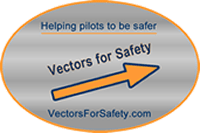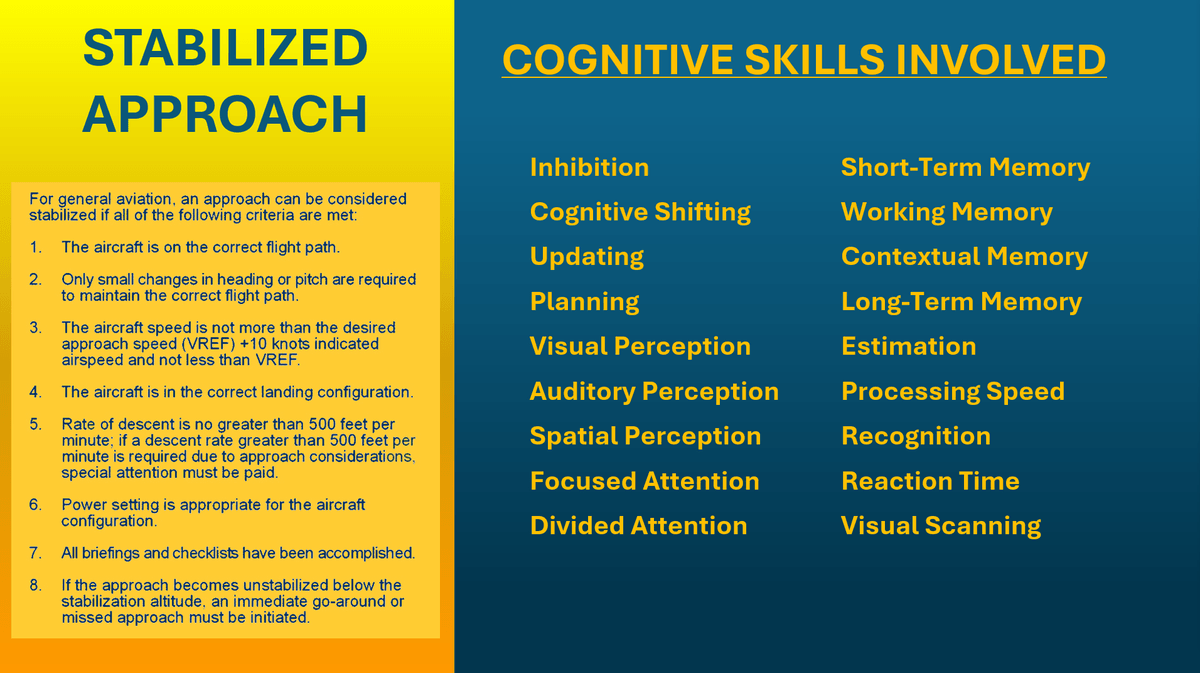
- Home
- Articles
- Privacy Policy
- Home
- Articles
- Privacy Policy
Combating Cognitive Decline in Pilots
Created and Narrated by Gene Benson

About this Course
This course is presented free of charge courtesy of Avemco Insurance.
This course discusses the main cognitive skills used by pilots, why each skill is important for safe flying, and strategies to slow the normal decline in these skills associated with aging. The course will require approximately one hour to complete.
The course is valid for 1 Credit, Basic Topic-3 in the FAA Wings Pilot Proficiency Program. To earn wings credit, you must view all the pages and successfully complete a 15-question, multiple choice quiz.
Sucessful completion of the course also qualifies for the Avemco Safety Rewards Program.
Course Introduction
View this video to learn more about your course.
Background
View this video to learn some background on our subject and see the "Flight Plan" for your course.
Cognitive Skills and Functions
View this video for an overview of our cognitive skills and functions.
Example of Cognitive Skills at Work
Most pilots are aware of the stabilized approach concept and use it on every approach. But have you ever thought about how your brain is evaluating each item and constantly guiding your decisions on what to do each milisecond throughout the approach? Look at each item shown in the stabilized approach. Then, for each item, look through the list of cognitive skills. You will see that many of the cognitive skills listed are necessary for each of the eight conditions. You will see that by the time you have thought about all eight conditions, all of the cognitive skills listed have been required multiple times.

Improving Cognitive Skills and Functions
Easy and Practical Improvement Methods
Executive Functions
Inhibition
Inhibitory control can be improved. Perhaps the best approach is to simply decide to
refrain from a behavior and then practice it. For example, put out a small dish of a favorite wrapped candy and practice walking by it and refrain from taking a piece. Other helpful activities include anything that requires you to have patience and restraint such as playing card games such as poker or commercial games such as Chutes and Ladders or chess. Even 10–20 minutes of moderate-intensity aerobic exercise can provide long-term benefits in inhibitory control.Working Memory
Working memory can be improved by activities that require working memory such as chess, jigsaw puzzles, Sudoku, games that require remembering rules, and matching games.
Cognitive Shifting
Cognitive shifting skills can be improved by playing strategy board games or card games that require strategy. Learning how to do something new or beginning a new hobby can also be helpful. Often a significant obstacle here is for the person to recognize and accept that there is a problem.
Updating
Updating can be improved by participating in games that rely on short-term memory and require quick switching between tasks. Many action video games fall into this category as do card games that rely on memorizing cards that have been played and planning the next move based on that information.
Planning
Planning ability can be improved by exercises and games that stimulate the prefrontal cortex. These would include any game that requires memory and planning such as chess, solving arithmetic problems without the use of a calculator, and cooking using an unfamiliar recipe.
Perception
Visual Perception
Significant problems with visual perception must be evaluated and treated by medical professionals. Mild problems can be addressed by certain active restorative activities. These might include dominoes, card games, matching pictures, word or rhyming pairs, word or picture bingo games, or peg patterns.
Auditory Perception
Unlike many cognitive skills, this one is difficult to improve by using common and readily available activities and games. Several commercially available online activities can be effective in improving mild auditory perception difficulties.
Spatial Perception
Spatial Perception can be improved by practicing anything that requires spatial orientation. Puzzles using 3D, assembling a model from a kit, playing ping pong, knitting, building a house of cards or other similar activities can result in improvement in this skill.
Attention
Focused Attention
The ability to focus attention can be improved by general improvement in health through exercise, diet, and getting adequate rest. Playing games that require focused attention can improve overall ability in that area. Also helpful would be learning an unfamiliar hobby such as cooking, knitting, playing a musical instrument, or solving crossword puzzles.
Divided Attention
Set aside 15 minutes. Put a news program on a radio or TV. Take all your eating utensils of all sizes (spoons, forks, knives, etc.) out of the drawer and mix them all up in a pile on a table. While listening to the news program, try to remember as many facts as possible and the identities of all advertisers while sorting the utensils as quickly as possible. When finished sorting, try to recall and count as many facts as possible from the news program. Mix the utensils up again and repeat the process. Make note of your score and repeat the exercise a few hours later or the next day. Keep a running total over a period of a week and watch for improvement.
Memory
Short-Term Memory
Since the different types of memory tend to work together, activities that require the use of any memory function may improve overall memory performance. These activities might include chess, various card games, memorization activities such as practicing learning and recalling a number sequence, names of state capitals, or online activities specifically designed to improve memory.
Working Memory
Training on specific working memory tasks can improve working memory overall. Activities like reading, playing cards, computer games, arts and crafts, sudokus, and crosswords can be effective.
Contextual Memory
Contextual memory may be improved by activities that encourage new synapses and neural circuits to regain some of the function that has been lost through injury or pathology and even through normal aging. These activities include any games or other exercises that rely on memory. Several online activities are specifically designed to aid in this process.
Long-Term Memory
Long-term memory may be improved by doing crossword puzzles, board games requiring memory, and chess. Adequate sleep is also essential for long-term memory.
Performance Skills
Estimation
We can work to improve our estimation skills using appropriate cognitive stimulation exercises. Dancing is an excellent activity since it uses and therefore provides learning regarding estimation of speed, distance, and time. Playing action video games and using a desktop flight
simulator program can be helpful. To get outdoors, horseshoes, cornhole, tennis, badminton, pickleball, and golf can also be beneficial.Processing Speed
Be creative. Any activity that forces you to think quickly is beneficial to maintaining or improving cognitive processing speed. The key is to perform the activity several times each day for at least fifteen minutes each time.
About Cognitive Decline
View this video to learn about cognitive decline.
The Good News!
View this video to see the good news about how cognitive decline can be slowed and maybe even reversed.
Special Note for Pilots
View this video to see some special ideas for pilots regarding cognitive skills.
Maintenance and Restoration of Cognitive Skills
View this video to learn about how we can work to maintain and restore our cognitive skills.
Cognitive Skills Exercise
Check your knowledge of our subject! This is an exercise, not a quiz.
Summary
Through this course, we looked at our important cognitiveskills and functions, how they decline with age, and most importantly, some steps we can take to slow, or even reverse some of the decline that has already
occurred.We must stress that doing all the things recommended would be ideal, but not practical for most people. However, doing as much as is realistic is really in our best interest.
For pilots, maintaining proficiency is essential if we want to be safe. We should note that a good established plan to maintain proficiency will also go a long way toward fighting cognitive decline. A good proficiency session will involve most of our cognitive skills and functions. A good workout in an airplane or a simulation device can be substituted for that day's brain exercises. Accomplishing two goals at the same time is always good! But on days when not participating in proficiency training, remember that other, non-aviation activities can be valuable in maintaining and improving overall cognitive ability through brain plasticity.
If you have any questions or comments on the course, please contact us at info@brightspotschools.com.
Thank you for taking the time to participate in this courseand always remember to "Fly like your life depends on it!"
Quiz
About the Quiz
To earn FAA Wings credit for this course, you must succesfully complete the 15 question, multiple choice quiz with a score of at least 70%. If you do not pass on the first try, you can simply take the quiz again. Once you complete and submit your quiz, credit will be issued usually within 24 hours, but please allow up to 5 days. Once credit has been issued, you will receive an email from faasafety.gov as confirmation. If you have a Wings account and the email from the FAA is inviting you to join the Wings program, you have entered an email address that is valid, but not your Wings email address. Very important! Be sure to enter the email address you use to access your Wings account.
Are you sure you studied each section above? If so, click the link above to begin the quiz.
Copyright © 2025 Gene Benson. All rights reserved.

